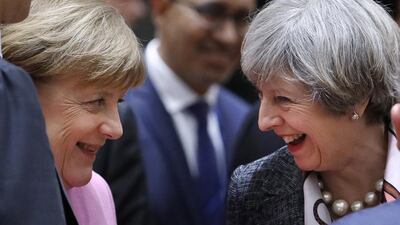In the business world as in international affairs, negotiations have become more complex. With more parties involved, interests are difficult to assess. Negotiators are challenged to evaluate the possible gain and cost of every possible negotiation’s outcome to decide on the best approach. Leaders ask them to conclude agreements in record time. Consequently, negotiators may exert unnecessary pressure or use tricks to achieve their goals. We have entered an era of complex negotiations. Business executives live this intricacy in the Middle East as much as around the globe. The Brexit negotiation is a good case to elaborate on some complex negotiations principles.
As the UK prime minister Theresa May signed on March 28 the letter engaging the United Kingdom into a two years’ negotiation to leave the European Union (EU), we should first remember negotiation is a process, guiding parties towards a resolution each one wants to see. Along this path, unknown elements may occur, which the negotiator must learn to manage. While the outcome is clear – the UK leaving the EU – negotiators will discuss the conditions of this political decision.
The UK asked to lead at the same time the Brexit negotiation and the discussion towards a new trade agreement with the EU. The European commissioner and designated negotiator Michel Barnier responded with pre-conditions. The French president Emmanuel Macron and German chancellor Angela Merkel supported Mr Barnier’s stand that the two issues be dealt with separately.
The EU negotiator wants to build a positive imbalance of power beforehand, to ensure a stronger position.
When preparing for the negotiation, each party will define a list of potential trade-offs and elaborate a list of objectives. They will trade concessions to reach their goals. An experienced negotiator never makes concessions to simply improve a relation. Value should be exchanged every time a trade-off is made. The objective is to maintain credibility and to enter a virtuous circle. But the pressure exerted by lobbies and public opinion can interfere with the negotiation process. Negotiators are pushed to accept concessions to avoid clashes. Today, negotiators are prepared to deal with media frenzy, without losing sight of their objectives.
Threats, ultimatums, lies and emotional pressure can be used by one or both parties to gain strength. But these are risky tactics. They may contribute to breach of trust, and lead to tougher positions.
Rather, experienced negotiators influence the other party, leading their counterpart to accept their point of view as their own. To illustrate this, police crisis negotiators often get hostage takers to release their victims without further violence. They lead them to understand this is for their best interest.
As of today, the EU estimates the UK should pay US$60 billion to compensate for the country’s exit from its commitments to the EU. Obviously, Ms May is not willing to pay. Her objective is to reduce this amount and reach a trade agreement that benefits the UK. Her interest is to protect the economy and British jobs. It is important to differentiate between interest and objective. Trade agreement with the EU or with other partners will benefit growth and jobs. Her objective helps protect her interest.
Because Mr Barnier, the EU negotiator, represents various countries with specific and sometimes conflicting interests, he needs to ensure the other party does not use these divisions to undermine his position. For example, the UK has recently accused Spain to have required that any future agreement will exclude Gibraltar, a British overseas territory, located at the south of Spain. In a recent comment, some UK parliament members mentioned an armed conflict if Spain was to encroach on Gibraltar’s sovereignty. This threat’s objective is to illustrate that a forced agreement may result in a conflict, knowing the European population does not want to see any escalation.
Weakening your counterpart position is a tactic often used in complex negotiations.
As the EU refuses to open discussions on a new UK-EU trade agreement until the Brexit negotiation ends, Ms May recently visited Saudi Arabia to express she wants the UK to be “the partner of choice” of the Arabian Gulf states, and was looking to use the “immense potential for Saudi investment to provide a boost to the British economy”. As well as during her meeting with the US president Donald Trump, she prepared the ground for new trade agreements. Her aim was to improve her position before the negotiation with the EU. If she is confident of these agreements, she can then adopt a tougher stance in her negotiation with the EU. Developing alternatives helps you raise the bar.
Considering the expected duration of the Brexit negotiation, parties may go through difficult times. Power can change, outside events can interfere and tactical moves may fail. In some cases, replacing the negotiator can help unblock a situation. But the move requires preparation. The new negotiator should be chosen according to the planned strategy. In particular, they must obtain all relevant information to define and adopt the right approach. Any confusion or contradiction with previous information weakens the negotiator’s power.
Brexit illustrates the complexity of modern international negotiations. Today, negotiators are required to develop new skills. They need to manage conflicting interests, versatile public opinions and media pressure. They need to adapt fast to the environment while maintaining the interests at the heart of their strategy. More than ever before, negotiators can’t simply rely on their intuition.
Radoine Nachdi manages the Abu Dhabi activities of Chalhoub Group and is a guest lecturer on business negotiation at Paris-Sorbonne University Abu Dhabi.
business@thenational.ae
Follow The National's Business section on Twitter

